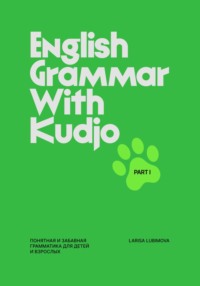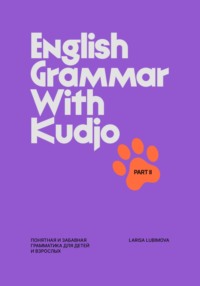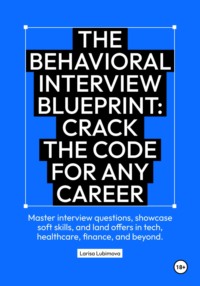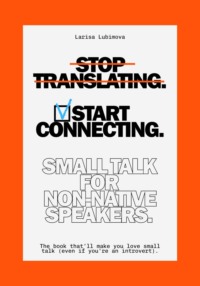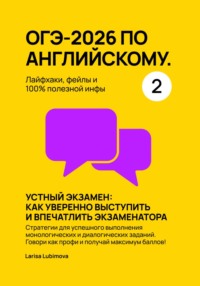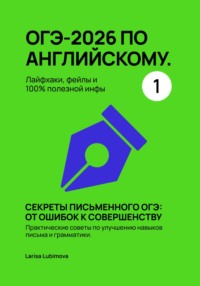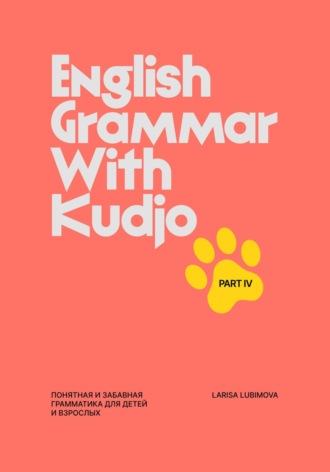
Полная версия
English Grammar with Kudjo. Part 4 Понятная и забавная грамматика для детей и взрослых
8 Surprisingly, the corridor turned out to be rather/fairly wide and high, so the friends could go quite/rather comfortably.
9 The only problem was that the corridor was rather/quite dark, which made it quite/pretty impossible to go fast.
10 After a couple of hours the dogs were quite/pretty sure that they had been going around the mountain all the time.
EXERCISE 9
Fill the gaps in the story with missing words:
At the point the dogs realised they had ***** going round in a circle, they bumped into Kit, who was ***** and speaking to somebody excitedly. The dogs could ***** believe their ears and eyes – there was ***** lying in a kind of wooden cage. He looked ***** but happy at the same time. Of course, everybody was flurried and couldn’t help ***** interrupting each other.

After calming down the friends tried ***** to break the cage and at this moment Kudjo suddenly saw the ***** hiding cowardly behind the dogs. Never before had the friends ***** Kudjo so furious! He roared absolutely ***** at the lynx and made such an incredibly ***** effort to attack her that broke the *****. The lynx was rather ***** than the dogs, who seemed deeply ***** by Kudjo’s behaviour, so she was able to make a quick get-away. After ***** the cage Kudjo was quite exhausted to follow her and lay down ***** to his friends and closed his eyes. He looked ***** worn-out. Luna immediately took out a bottle with ***** and poured it right into his *****. Everybody could hardly breathe with ***** anxiety. Kudjo opened his eyes very ***** and said that a piece of meat would make a miracle as well. After such words the friends sighed with ***** relief and gave him a ***** hug.
EXERCISE 10
Find and correct 15 mistakes in the sentences:
1 The story that Kudjo told his friends sounded absolutely unbelievably.
2 Everything started that night when last Chilly saw Kudjo following the blue glowing ball into the middle of nowhere.
3 Actually, at that time Kudjo hadn’t got very far, not farer than a kilometre from the car until he tripped over something and fell down into a very huge pit.
4 Having tried quiet hard to get out of the trap, Kudjo started barking as loud as he could, but nobody seemed to hear him.
5 Feeling very helpless, Kudjo lay down to sleep on a very enormous pile of leaves, which, actually, had helped cushion his fall.
6 The morning came with somebody’s loudly purring above. He looked up and saw a pretty huge wild cat watching him close.
7 The lynx looked nicely and friendly and helped him get out of the trap.
8 She told him the story about a crazy scientist and promised to take him to his underground secret laboratory.
9 Before going there, she suggested having breakfast in her cave near and Kudjo agreed wholehearted to follow her.
10 In the cave while having a hearty breakfast, openly Kudjo told her everything about the curse attached to Luna’s family, the ghost of Luna’s great-great-great-great-great grandmother and his plan to break that curse.
EXERCISE 11
Choose the correct option:
1 Leaving the cave, the lynx wanted Kudjo to follow her *****, but he stopped to look around, feeling something *****.

a immediate / suspicious
b immediately / suspicious
c immediately / suspiciously
2 He couldn’t help feeling *****.
a quitely strange
b quite strange
c quite strangely
3 Kudjo had ***** feeling that he knew this place very well.
a quite a fun
b a quite funny
c quite a funny
4 He kept looking around *****, but couldn’t understand what the place was.
a very carefully
b rather carefully
c very careful
5 Finally, he realised it was the smell that made him feel *****.
a rather weird
b very weird
c rather weirdly
6 Everything around smelt ***** as if he were in his own garden with his friends.
a extremely nicely and pleasantly
b absolutely nice and pleasant
c extremely nice and pleasant
7 ***** he smelt everything, ***** he wanted to be with his friends.
a Longer / more desperately
b The longer / the more desperate
c The longer / the more desperately
8 When Kudjo told the lynx about his feelings, she said she was ***** his friends must have been caught by the insane scientist.
a quite certainly
b very certain
c quite certain
9 After such words Kudjo became ***** to find that lab.
a far more determinedly
b far more determined
c by far more determined
10 He thought ***** about himself at that moment.
a most little
b leastest
c least
EXERCISE 12
Translate the story:
Теперь уже Куджо торопил рысь. Ему очень хотелось как можно быстрее попасть в эту самую лабораторию и убедиться, что ни одни из его друзей не попал туда. Куджо шел за рысью и думал откуда появляются безумцы, готовые ставить самые ужасные опыты на животных и почему их никто не останавливает. Он размышлял о том, как сразу после того, как он уничтожит лабораторию и выпустит животных на свободу, он еще раз попытается найти приведение пра-пра-пра-пра-пра-пра бабушки Луны, чтобы отдать ей недостающий кусочек пазла. Он был почти уверен, что это положит конец семейному проклятию и все опять будут жить беззаботно и весело. Стоп! А где же кусочек пазла? Куджо был абсолютно уверен, что он был все время с ним. Он выглядел настолько потрясенным и расстроенным, что рысь тоже разволновалась. Она постаралась успокоить Куджо, уверяя его, что он скорее всего оставил этот кусочек в пещере или в яме и они непременно его найдут, сразу же после разгрома лаборатории. Рысь звучала убедительно и Куджо немного успокоился. Тем более, что они уже подошли к горе, под которой скрывалась лаборатория. Гора выглядела не очень естественно, казалось даже, что она сделана из какого-то сплава камня с металлом. Они вползли через какой-то ход, который привел их в небольшую комнату с огромной клеткой….
(продолжение следует)
Unit 7
Nouns
COUNTABLE – UNCOUNTABLE NOUNS
Countable nouns are things that can be counted. Most nouns in English are countable: three dogs, two ghosts, etc.
These nouns can have plural forms and be used with a, an, some, any, every, each, all, several, many, plenty of, a (large, great, good) number of, a couple of, a lot of, lots of, few, a few, fewer, the fewest, both, either, neither, none of.
Uncountable (or mass) nouns are things we typically view as a single entity. We cannot count them or divide them into separate elements: air, information, etc.
They cannot be plural. informations, advices, happinesses,
There are some exceptions. Sometimes you can hear: I’ve had two coffees. It is just a short way of saying two cups of coffee.
Another exception is to make the uncountable noun plural while talking about several different types of an uncountable noun:
Luna loves all the meats. (meats = types of meat)
Other nouns that can be used this way include cheese, oil, metal, wine, food, bread, and fruit.
You can’t use a/an with uncountable nouns but you can use some, any, plenty of, this, that, all, much, a great/good deal of, an amount of, a lot of, lots of, little, a little, less, the least, none of.
The most common uncountable nouns are:
Mass nouns: fluids: blood, milk, water, etc., solids: bread, ice, iron, etc., gases: air, smoke, steam, etc., particles: dust, hair, salt, etc..
Subjects of study: History, Literature, Psychology, etc.
Languages: English, German, Spanish, etc.
Games: chess, football, tennis, etc.
Diseases: flu, measles, mumps, etc.
Natural phenomena: fog, sunshine, thunder, etc.
Some abstract nouns: accommodation, advice, housework, etc.
Collective nouns: baggage, furniture, money, etc.
EXERCISE 1
Write (C) if the noun is countable or (U) if it is uncountable:
1 mineral water
2 toast
3 silver
4 Geography
5 weather
6 coin
7 advice
8 backpack
9 knowledge
10 traffic
11 tunnel
QUANTIFYING UNCOUNTABLE NOUNS
Many uncountable nouns can be made countable by adding a partitive: a slice of bread, a strand of hair, a drop of water, a bar of soap, an ear of corn, a blade of grass, a ray of light, a coat of paint, a glass/bottle of water/lemonade/iced tea, a jar of jam, a can of Coke, a tin of salmon, a sheet of paper, a box of chocolates, a packet of cookies, a slice/loaf of bread, a pot of yoghurt, a pot/cup of tea, a kilo/pound of meat, a rasher of bacon, a tube of toothpaste, a bit/piece of chalk, a bag of rice, a pair of trousers, a game of football, a (n) item /piece of news, a carton of milk, a block of wood, a flash/bolt of lightning, a clap/peal of thunder, etc. With most nouns like information, advice, equipment, and furniture, we can use the word piece: Kudjo is wise enough to give a lot of pieces of advice.
EXERCISE 2
Make the following uncountable nouns plural in all possible ways, as in the example:
luck – two strokes/pieces/bits of luck
1 information – a couple of
2 beef – three
3 thunder – several
4 buckwheat – a few
5 toast – four
6 blood – a few
7 honey- many
8 luggage – five
9 bacon – ten
10 soda – plenty of
11 soup – a good number of
There are some nouns that can be either countable or uncountable depending on the situation. Here are some common nouns of this kind:
1. paper
countable – a document or a newspaper
uncountable — paper in general
2. time
countable — an occasion
uncountable — the general concept of time
3. experience
countable — an event
uncountable — experience in general
4. room
countable – a part of a flat or a house
uncountable — space in general
5. light
countable — a source of light
uncountable — light in general
6. glass
countable — a container for drinking
uncountable — material
7. hair
countable – a strand of hair
uncountable – all the hair on someone’s head
8. iron
countable — an appliance for ironing clothes
uncountable — material
9. wood
countable – a forest
uncountable – material
10. work
countable — a creation
uncountable – process
11. chicken
countable – an animal
uncountable – food
12. memory
countable – a specific memory of a past event
uncountable — the ability to remember
13. beauty
countable — a beautiful woman
uncountable — the quality that makes someone or something attractive
14. business
countable — a company
uncountable — the activity of making, buying or selling things
15. danger
countable – a person or thing that can harm or kill
uncountable — the possibility of something very bad happening
16. failure
countable — a person or thing that is not successful
uncountable — lack of success
17. freedom
countable — the right to do what you want to do
uncountable — the state of being free
18. gossip
countable — a person who likes telling and hearing gossip
uncountable — untrue stories about other people’s private lives
19. jam
сountable — many vehicles stuck together in traffic, or a difficult situation
uncountable – sweet food that’s made from fruit
20. land
countable — a country or region
uncountable – the earth’s surface
21. nature
countable – the basic character of a person or an animal
uncountable – all living things and their habitats
22. noise
countable — a particular sound
uncountable — loud or unpleasant sound
23. toast
countable — the act of drinking to someone’s happiness
uncountable — sliced bread browned in a toaster
24. youth
countable — a young man
uncountable — the time in someone’s life when they’re young
EXERCISE 3
Complete the sentences using the noun in bold in the form of a countable (in plural or with the article a) or an uncountable noun:
1 experience
a Kudjo had never had such ***** before he got to the hidden lab.
b Kudjo had no ***** in communicating with scientists, needless to say, with insane ones.
2 danger
a Frankly speaking, he was smelling ***** there, but he couldn’t turn back.
b If only he had known that real ***** was next to him!
3 light
a There was no ***** underground, which was going to make the walk scarier.
b Fortunately, the lynx had little *****, which was enough to let them see where to go.
4 noise
a The most striking was ***** because even the noise of the forest couldn’t be heard underground.
b Suddenly Kudjo heard strange ***** as if a metal object clattered on the stone floor.
5 gossip
a The lynx pretended not to hear anything and started telling Kudjo some ***** about the scientist quite loudly.
b Kudjo didn’t expect her to be such *****.
6 room
a Listening to her rumours, Kudjo didn’t notice that their journey had ended up in spacious *****.
b There was enough ***** for more than ten Kudjos.
7 wood
a The only object in this room was a large cage made of *****.
b It reminded Kudjo about the trap in ***** and made him a bit suspicious.
8 freedom
a No sooner had he thought it was a right place to deprive animals of ***** than the lynx pushed him into the cage and locked it.
b Who gave her such ***** to do what she likes?
9 time
a Kudjo tried to get out of the cage dozens of *****, in vain.
b To his horror he realised that he didn’t know how much ***** he would have to spend locked in.
10 failure
a He cursed himself for his stupid gullibility, which brought his plans to *****.
b He couldn’t help admitting being complete *****.
11 memory
a He tried to evoke recent ***** so as to understand where he had made a mistake but he couldn’t.
b He blamed his poor ***** and fell asleep in despair.
PLURAL NOUNS
Some nouns are always plural and take a plural verb: archives, belongings, movables, clothes, congratulations, thanks, brains (intellect), nuptials, tidings, contents, earnings, goods, outskirts, premises, remains, surroundings, arms, ashes (of a dead cremated body), barracks, headquarters, (good) looks, riches, stairs, wages, breadcrumbs, leftovers, dregs, eatables, (dis) likes, blues, hysterics, condolences, creeps, jim-jams, shenanigans, guts (bowels, courage), pains (take pains), mores, odds, whereabouts, smithereens etc.
Some nouns for things with two parts (often clothes, tools or equipment) also end in -s and are always plural. They include: pyjamas, trousers, jeans, dungarees, overalls, pants, shorts, tights, scissors, pliers, tongs, nippers, tweezers, binoculars, glasses, spectacles, goggles, headphones, earphones, scales, compasses, braces, handcuffs, etc.
Some nouns can have a different meaning when they are in the plural:
air — atmosphere
airs – arrogance, self-importance
custom — a habit, tradition
customs – the place at a port, airport, or border where travellers’ bags are looked at to find out if any goods are being carried illegally
force – strength or energy
forces — an organised military force
spectacle – an unusual or unexpected event or situation that attracts attention
spectacles – glasses
Kudjo’s spectacles make him look serious and clever.

manner – a way or method
manners – polite or well-bred social behaviour
compass — a device for finding direction
compasses – a V-shaped device that is used for drawing circles
scale — a set of numbers, amounts, etc., used to measure or compare the level of something
scales – a device for weighing things or people
people — men, women, and children
peoples — nations
EXERCISE 4
Find the proper noun and put it into the correct gap: blues, eatables, guts, surroundings, smithereens, brains, pliers, belongings, nippers, odds, pains, creeps
1 Kudjo didn’t sleep well because he felt nervous in unfamiliar *****.
2 He wished he could be slugging now in his bed in his room with all his favourite ***** around.
3 He regretted not having any tools with him, especially, the*****or *****to break the lock on the cage.
4 His own helplessness gave him the***** and he even started whining.
5 Suddenly he heard a kind of hissing and immediately imagined a big snake slithering towards him. It gave him such ***** that he couldn’t help roaring at the darkness.
6 The hissing stopped but the dead silence was now far scarier than any sound and Kudjo didn’t have the ***** to keep his eyes open.
7 Suddenly he felt something soft touching him. He took great *****to look through his half-closed eyes.
8 What he saw made him think that the fear had scrambled his *****and he had hallucinations.
9 There was Kit sitting in front of him and smiling happily. The next moment the kitten jumped onto the cage hoping to smash it to *****.
10 Having realised that it was no use doing it, Kit sighed heavily, sat down next to the cage and offered some ***** to Kudjo.
11 At this very moment Chilly, Luna and Cuba turned up. Against all the *****, the friends were together.
THE PLURAL OF NOUNS
Nouns are made plural by adding:
– s to the noun: a pit – pits
– es to nouns ending in -s, -ss, -x, -ch, -sh, -z or -zz: a bush – bushes
– ies to nouns ending in consonant + y: an enemy – enemies
but -s to nouns ending in vowel + y: day – days
– es to nouns ending in consonant + o: a hero – heroes
but -s to nouns ending in vowel + o: a boy – boys, abbreviations:
photograph /a photo – photos, musical instruments: a piano – pianos and proper nouns: Filipino – Filipinos.
Some nouns ending in -o can take either -es or -s: a buffalo – buffaloes / buffalos, a mosquito – mosquitoes / mosquitos, a volcano – volcanoes / volcanos, a zero – zeroes
Конец ознакомительного фрагмента.
Текст предоставлен ООО «Литрес».
Прочитайте эту книгу целиком, купив полную легальную версию на Литрес.
Безопасно оплатить книгу можно банковской картой Visa, MasterCard, Maestro, со счета мобильного телефона, с платежного терминала, в салоне МТС или Связной, через PayPal, WebMoney, Яндекс.Деньги, QIWI Кошелек, бонусными картами или другим удобным Вам способом.



